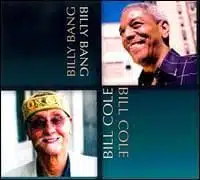
Violinist Billy Bang and double-reed musician Bill Cole have worked together before, but this is their first time performing strictly as a duo. The music that the two of them create spontaneously is elastic, weird, and indescribably moving. It’s almost kind of a shame that the chemistry created between these two, without a backing band, wasn’t fully explored until both men were invited to give a lecture at the University of Virginia. Better late than never, though. Bang and Cole headed into the university’s chapel in April of 2009 to play three originals and three improvised pieces in front of a very appreciative crowd, and Billy Bang Bill Cole is the result.
The music stirred up by these two men really does take on a life of its own, stretching every noticeable boundary for harmony, tempo, texture, and what passes for melodic interpretation. Billy Bang sticks to violin through the whole set, but Bill Cole switches between digeridoo, nagaswarm, sona, flute, and shenai (I’ll give you a moment to Google some of those). Instead of sounding like two instruments, the violin and whatever Cole is playing have a strange way of blending into one sound that is altogether bold but not brash. As Cole lets the digeridoo do its drone thing on the first untitled improvisation, Bang drearily pokes in and around the constant note to make some sort of all-encompassing sound: a digerilin, if you will.
As one would expect, the composed numbers have more melodic stakes than the improvisations. “Shades of Kia Mia,” a Billy Bang piece that already made its way to CD ten years back, feels like it’s going in two different directions at once while maintaining a mood that sits somewhere between melancholy and madness. Speaking of maddening things, Bang’s other original “Jupiter’s Future” pits its main lines against one another in a whole step harmony that almost inflicts mental pain. Bill Cole’s one original “Poverty is the Father of Fear” sets things in a more tangible light, though not by much. Its conventional sense of melody and form are eventually shattered by a frantic, caterwauling search for some higher purpose. It’s also a good reminder that, given the untempered properties of their instruments, such music would sound like total crap in the hands of just anyone else.
The mix feels a little dangerous, though. The sounds conjured up by Bang and Cole are very delicate while the enthusiastic whoops and hollers (and coughs) from the audience sound like they are captured by one pretty hot mic. A noticeable microphone “thunk” is unfortunately captured in the first track, though you can fault neither the musicians nor engineers for leaving the problem alone. So while passive listeners accustomed to music as background will not be bothered by these quirks, audiophiles and headphone listeners may be distracted. Who listens to Billy Bang as background, anyway?
I had the opportunity to hear and review Billy Bang’s Prayer for Peace last year, and this album is definitely the more sprawling and exploratory of the two. Whereas Bang’s ensembles will thrive within a certain modern jazz framework, Billy Band Bill Cole is the kind of collaborative live album that pulls out all the stops and just runs with it. Exactly what “it” is isn’t easily defined, nor should we expect it to be. This is music that exists by floating, so I say let it.
